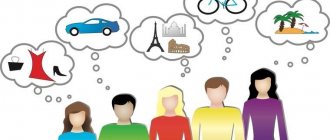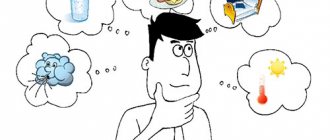In this article we will tell you:
- Determination of human social needs
- Conditional classification of social needs
- Fromm and McClelland's classifications of social needs
- Examples of social needs
- Managing human social needs
- Development of social needs of the individual
The social needs of the individual, although they are of less importance than the biological ones, remain significant for a harmonious life and human development. If existence is basically impossible without water, food and shelter, then without interaction with society and people you can at least live.
Social needs are heterogeneous and are divided into certain types. In our article we will tell you what they are, understand the approaches to their classification and talk about how to develop social needs and manage them.
Concept
The term includes a set of desires that arise in the process of life in society and during interaction with others. It should not be confused with primary needs - food, drink, safety, rest, comfort.
In relation to the primary ones, social needs are secondary. An individual cannot exist without food or sleep, because this will lead to his death. The absence of secondary needs does not entail such tragic consequences, but it can have a negative impact on psychological health and become an obstacle to socialization.
In addition, dissatisfaction leads to a decrease in living standards. There are often cases when this, in turn, makes it difficult to complete the primary ones. For example, an unfulfilled desire at work leads to a loss of confidence in the future, and therefore security.
Why is lack of communication so bad?
A person has a feeling of uselessness. The person suffers, feels unattractive, experiences fear and anxiety, which are often unfounded. Some feel uncomfortable being in society because of poor relationships with others, when they are isolated from certain social groups and contacts.
But this does not mean that to satisfy this need a person needs to communicate constantly. A mature person who has strong friendships, is not devoid of a sense of emotional support, and has a significant social status can be in a state of rest for several hours. Therefore, it is important to learn competent communication, realize your desires through it and become a holistic, accomplished person. Now we know that the need for communication is one of the social needs, but it is no less important than the others.
The nature of the social needs of the individual
In a broad sense, social need is explained as a form of contact of a living being with the surrounding reality. For people, these are aspirations that are characteristic of all individuals, as representatives of the human group.
An individual’s belonging to society gives rise to emotionally charged drives. When they are implemented, personal growth occurs. Needs provide motivation for activity and shape behavior, and as they are satisfied, they are replaced, and new desires come into activity.
Biological requirements are expressed in the need to maintain the functioning of the body. In humans, as in animals, realization occurs in the form of an unconscious instinct. However, the question of the “foundation” inherent in this concept remains controversial in the scientific world.
Supply and demand
This well-known phrase is very easy to apply to the topic under discussion. Today, the level of production activity determines how well it satisfies the needs of certain people. If the state has not produced the required amount of a particular good, then the needs of citizens are not adequately satisfied. Based on the level of wealth of society, it is also determined how much needs to be imported or produced. And understanding the role and place of the population’s needs is achieved through the interaction of needs and production. And nothing else.
The transition of production to a higher, better level affected the needs. While primitive people were content with a piece of raw meat barely roasted over an open fire, today we need a stove, oven or grill to make food suitable for consumption. And since one quickly gets used to good things, the rise in needs often outstrips production. Needless to say, even if workers at garment factories are trying to find out as quickly as possible what trends and new items have been developed in fashion houses.
Types of human social needs
Fulfilling needs helps not only to develop, but also to improve the standard of living. But understanding the huge variety is not as easy as it seems at first glance. Conventionally, basic drives are divided into 3 categories. And my consultation will help you determine your own desires and make every day happy.
For myself
These are aspirations that help to achieve the desired degree of development and status in society. These include:
- Self-identification. The need to be like a specific person or image. This is how the child correlates his “I” with the parent of his gender and thereby begins to recognize himself as a boy or a girl. This becomes active at different stages: when studying at school, university, at work, when starting a family.
- Self-affirmation. An individual wants to realize his full potential and take a worthy position in society. He achieves the respect of others and establishes himself as a professional in a certain field.
This also includes the need to have power and gain universal recognition. A striking example of such a social human need is Benvenuto Cellini. This undoubtedly talented sculptor lived a long life, also becoming famous as a jeweler, warrior and writer. In his last years, he released an autobiography, where, in an effort to gain even more fame, he attributed to himself actions that he had never committed.
Psychologist Daria Milai
Make an appointment
For others
This category differs from the previous type in the absence of egoistic manifestations. A striking example is altruism. This is free help to others, even if it comes to the detriment of one’s own interests and benefits. A person cares about people as much as he cares about himself, and sometimes even better.
Such an individual wants to selflessly serve humanity, is ready for self-sacrifice, and strives to protect the weak.
In addition, this includes selfless friendship, built not on benefiting from communication, but on the mutual sympathy of friends. And, of course, love. This is a special feeling that takes place in everyone. Often it is synonymous with the meaning of existence, the personification of happiness. Its role in life cannot be overestimated.
This is the reason why families are formed and children are born. And vice versa, the basis for psychological and often physical complications is if the love is non-reciprocal, unhappy or unsatisfied.
This is an effective motivation for activity and development, because it inspires new achievements. Satisfying a person’s social need for love for parents, child, existence, work, city is the basis for the formation of a harmonious and full-fledged personality.
Together with others
This is a set of needs that unite the actions of individuals in solving social problems that have become the most pressing at the moment. This includes the need for security, universal peace, and freedom.
The most revealing example is the invasion of fascist troops into the territory of the USSR. All people, regardless of gender, religion and place of residence, united for a common goal - to repel enemies.
Independence, justice, humanity and adherence to the rules of ethics and ethics - these are the points that everyone wants not only for themselves, but also for loved ones and all of humanity.
Being love
This feeling is based on recognition of the unconditional value of a loved one, but not for any qualities or special merits, but simply for the fact that he exists. Of course, existential love is also designed to satisfy human needs for acceptance, but its striking difference is that there is no element of possessiveness in it. There is also no desire to take away from your neighbor what you yourself need.
The person who is able to experience existential love does not seek to remake a partner or somehow change him, but encourages all the best qualities in him and supports the desire to grow and develop spiritually.
Maslow himself described this type of love as a healthy relationship between people that is based on mutual trust, respect and admiration.
Classification of human social needs
There are many divisions of human aspirations. The most famous of them is A. Maslow’s pyramid. It has several levels from the simplest to the most advanced needs. The scientist argued that the realization of desires of a low category leads to the emergence of those that are one level higher.
Face-to-face consultation
What are the features and advantages of face-to-face consultation?
Find out more
Skype consultation
What are the features and benefits of Skype consultations?
Find out more
According to the theory, all personality drives are innate and are organized into a specific hierarchy according to priority. It looks like this:
- Physiological: food, drink, rest, sleep.
- Security: stability, orderliness, security, freedom from fear and anxiety, chaos.
- In a sense of necessity, manifestations of love: friendship, family, one’s own social circle.
- In the respect of others: fame, irreplaceability, recognition, self-esteem, reputation, position in society.
- In self-realization: profession depending on abilities and interests, development of skills.
However, Maslow foresaw exceptions to the rules. For some, the need for self-affirmation may be higher than realizing their potential and doing what they love. The list of social needs also includes primary and secondary.
Congenital
They are also called physiological. Without the implementation of such requests, a person simply cannot exist. These include hunger and thirst, the need to breathe clean and fresh air, get enough sleep regularly, and satisfy sexual desire.
This also includes security and confidence in the future, economic stability. All this is inherent in people at the genetic level.
Purchased
They are psychological in nature and appear only with increasing life experience. This is the desire to become successful, to occupy a high position in society, to gain universal recognition and respect, and to start a family. Secondary needs also have a classification:
- Social. The desire to communicate with people, demonstrate skills and knowledge in public life, and achieve a worthy place. All this develops depending on the individual’s ideas about the structure of society.
- Ideal. The desire for independent development: obtaining new information, studying reality, learning the meaning of life.
- Spiritual. They appear when an individual strives to make life experience richer, expand his horizons, develop his own creative abilities, and realize the beautiful. This makes you take an interest in world culture, work not for profit, but for your growth and desire to know yourself through work.
Despite the fact that social needs are considered secondary, they are more significant for people. For example, a student is very sleepy, but instead he is studying for an upcoming exam. Mom takes care of the baby, forgetting to eat.
There are many such situations that can be cited. After all, everyone strives to be active and useful in society, to establish positive interpersonal relationships, and to earn the respect and recognition of others.
When it is not possible to realize these drives, a feeling of uselessness and uselessness appears. This has a profound psychological effect on him.
Hierarchy
The diversity of human nature is the reason for the existence of various classifications of needs: by object and subject, areas of activity, temporary stability, significance, functional role, etc. The most widely known is the hierarchy of needs proposed by the American psychologist Abraham Maslow.
- The first stage is physiological needs (thirst, hunger, sleep, sexual desire, etc.).
- The second stage is security (lack of fear for one’s existence, confidence).
- The third stage is social needs (communication, friendship, love, caring for others, belonging to a social group, joint activities).
- The fourth stage is the need for respect from others and oneself (success, recognition).
- The fifth stage is spiritual needs (self-expression, revealing inner potential, achieving harmony, personal development).
Maslow argues that satisfying needs at the lower levels of the hierarchy leads to strengthening of higher ones.
A thirsty person concentrates his attention on finding a source of water, and the need for communication fades into the background
It is important to remember that needs can exist simultaneously, the issue is only a matter of priority
What is a person's social needs?
One of the priority needs is internal sensations. For example, the desire for freedom and independent position. The individual wants to break out of the usual framework, if he has one.
Hedonism is another desire that everyone has. Everyone loves to periodically be in a state of serenity, both material, spiritual and physical. But many deny this “wish”, although it is present on a subconscious level. And that's okay. After all, if at the moment there is no way to achieve comfort, then it is easier to convince yourself that it is not necessary.
What else is included
Everyone at least sometimes wants to be the center of attention to feel important. And the point here is not selfishness, but self-respect, increasing authority in one’s own eyes.
No matter how contradictory it may seem, everyone needs negativity. Aggression is a characteristic inherent in everyone. The manifestation of feelings leads to self-satisfaction, a feeling of rightness.
But not everything is so bad, and the need for goodness is also included in the list. Everyone had a desire to help a loved one for free, to perform a selfless act. After this there is a sense of nobility and caring.
Briefly about what the needs are
In general, there are many classifications of needs. Let's consider one of them:
- Material. Associated with the receipt of certain funds (goods, money or services) that are necessary for normal human life.
- Spiritual needs. They help in understanding oneself and the world around us, existence. This is the desire for self-improvement, self-realization and development.
- Social. Everything related to communication. This includes the need for friendship, love, and so on.
Needs are the engine through which human development and social progress occur.
Basic sociogenic need
- Activity. Attraction can be divided according to different characteristics: nature, intensity, results. But the fact that a person wants to work is a fact. A person can spend a day, a week or even a year playing computer games. But he will get tired of it, as well as the feeling of uselessness. Along with work, he satisfies the need for recognition, respect, and gaining power. The opposite situation is when, after completing a lot of work tasks, there is a need for rest, both physical and spiritual.
- Self-development. A complete person always wants to gain knowledge and skills. You can do this all your life, learn new things and improve.
- Communication skills. People need to establish and maintain trusting relationships that help them share their own experiences and emotions and receive feedback.
Why is it necessary?
Through communication, personality develops. A person gets to know the world, learns to evaluate actions, analyze situations, master moral norms, rules of behavior, which he will then use. Gains undeniable life experience in society. And thus creates his own attitudes and moral principles, socializes, forms a legal and political orientation. Therefore, the need for security and communication are the most important conditions for normal human development.
Implementation examples
Let me give you real life situations:
- Category "for yourself". From an early age, the child tries to comprehend the surrounding reality. From the moment he gains the ability to talk, he is interested in everything he sees, bombarding his parents with questions. With the ability to read, he begins to extract answers from books. The development process occurs without stopping: while watching TV, while walking, in kindergarten classes. The data is then retrieved when studying at school or university. In everyday life, when a person is faced with a question that interests him, he begins to look for an answer to it.
- Category “together with others”. Everyone has a desire to exist in a free and fair society, where the rules of morality and ethics and legislation are strictly observed. Communication is based on the principles of equality and mutual respect. The individual tries to behave decently, according to basic standards of behavior.
- Group "for others". Unfortunately, altruism is poorly manifested in modern life. This concept implies a complete or partial renunciation of one’s own “wants” in favor of others. But not everyone can sacrifice their interests. However, this need is being satisfied. This includes helping those in need, charity events, creating a shelter for animals and the homeless.
Significance
Satisfaction of needs is the key not only to the formation of a mature personality, but also to stability in general. The correspondence of desires with the education received, the profession, and the circle of loved ones creates useful members of society.
Ask a question
Any realized aspiration leads to a larger result: creating a strong and happy family, fulfilling work responsibilities and, as a result, a successful career.
Such people do not show signs of deviant behavior. When individuals do not have the initiative to take important social actions, disorder and anarchy reign. This deteriorates the quality of life of individuals, and also disrupts the usefulness of society.
Hierarchy of interests
In simple words, the hierarchy of interests is a pyramid, at the base of which are secondary interests, and at the top are the main ones.
From this diagram you can see the interests of twelve-year-old Petya Ivanov. Petya is good, he is interested in studying, but lessons are not the most important thing for him. He spends more time on the street, playing football with the kids in the yard. But Petya’s favorite pastime is watching and helping his father repair small household appliances, engines, and solder wires on various parts with a soldering iron. Most likely, in the future Petya will become an engineer, a car mechanic, and will repair special equipment.
A large number of interests indicates the comprehensive development of the individual. But among everyone there is a main hobby that prevails over everyone. Such interest needs to be given more time and attention. Most likely, it will be associated with the choice of profession in the future.
The cover of the lesson is taken from the source.
Result
The complex of needs becomes a source of activity and stimulates activity. After all, all actions and actions are carried out in order to obtain benefits. This can happen directly: to communicate, it is enough to leave the house and meet friends or talk to loved ones.
Other goals force and solve a number of problems leading to it. For example, in order to achieve a worthy position, you need to make progress in your professional field.
But if it is impossible to live without satisfying biological needs, then social ones can be omitted. The reason for this is laziness, lack of initiative, and fears. A person may experience an urgent need for communication, but at the same time have no acquaintances due to his insecurity and low self-esteem. In this case, there will be no threat to life, but a feeling of uselessness and loss is guaranteed.
Why are they important?
Maslow noted that an individual who does not satisfy biological needs simply will not be able to live and function as a healthy person. The same picture applies to social needs. Without their satisfaction, a person begins to doubt his own worth. Becomes weak, helpless, vulnerable and even humiliated.
This condition forces a person to commit immoral acts and express aggression. Therefore, social needs, namely the need for self-esteem, recognition of oneself as a person with self-esteem, supported by interpersonal relationships, lead to successful self-realization and the acquisition of confidence. Let's figure out what needs are social.










